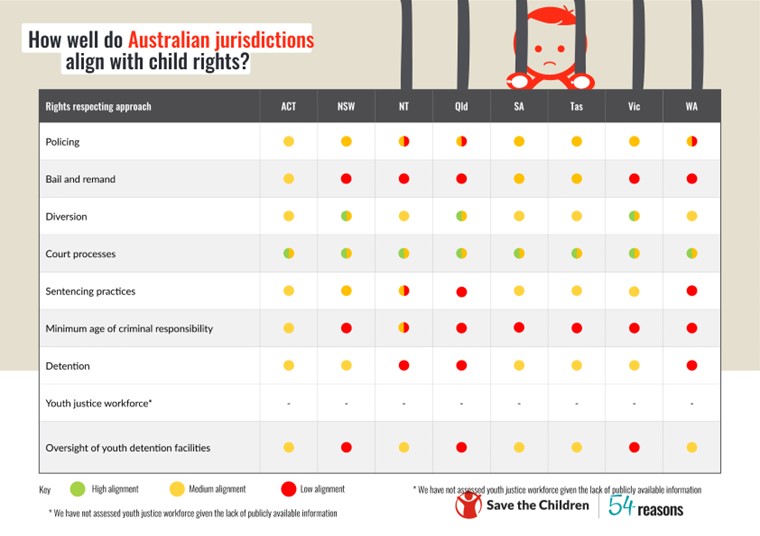Widespread child rights abuses in Australia’s youth justice system are today detailed in a new Save the Children report, which calls for an urgent nationwide overhaul to ensure better outcomes both for children and the community.
The report reveals every Australian state and territory jurisdiction has a long way to go to uphold the rights of children across the areas of policing, bail and remand, diversion, court processes, sentencing practices, and detention.
Western Australia, Queensland and the Northern Territory were the worst offenders when it comes to violating the rights of children in youth justice facilities. In all three jurisdictions, the use of adult facilities to detain children, as well as the use of excessive force and restraint, were identified as significant breaches of children’s rights.
Western Australia is detaining boys in the maximum-security adult Casuarina prison and last year was revealed to be using a dangerous restraint technique on children, which was replaced with an alternative method following criticism.

In February, Queensland introduced legislation to criminalise breach of bail for children, along with other punitive measures, despite acknowledging the legislation was inconsistent with the state’s Human Rights Act (2019).
Shane*, who just turned 18, has been in and out of the youth justice system in Queensland since he was 13 years old. He describes mixed experiences with the authorities.
“Last time I was in contact with police was in a watch house and they treated me like I wasn’t even there. I was in the watch house for nine days,” he said.
“Sometimes [the police] can be alright, other times they just treat us like scum, like we’re adults not juveniles.”
Save the Children Australia CEO Mat Tinkler said Australia’s youth justice system was failing to adequately support vulnerable children in contact with the law and keep communities safe.
“Australia’s youth justice system is responsible for repeated, egregious breaches of children’s rights, often resulting in direct harm to many children,” he said.
“We are a nation that prides ourselves on giving everyone an opportunity to succeed, and yet authorities are setting children and young people up to fail.
“We know what works and what doesn’t. State and Territory governments must invest in strengthening and expanding early intervention and diversion programs.”
Australia has made a significant shift towards prioritising incarceration well above diversion and rehabilitation, including the use of isolation, separation, and lockdown in youth detention facilities. This is despite the evidence showing prevention and early intervention are the methods that most reduce crime.
A child rights approach would ensure youth justice policies and practices align with Australia’s international human rights obligations, and provide long-term improvements for children, young people, and communities.
“The global evidence base shows that a rights-based approach to youth justice will lead to better outcomes for children, the community and governments,” Mr Tinkler said.
“The punitive and ‘tough on crime’ approaches of Australian governments are the opposite of this: they punish children for being victims of underlying causes like poverty and inequality; poor access to education and family support; and lead to children cycling back into the system again and again.
“By adopting a child rights approach to youth justice, governments can improve how the youth justice system operates, leading to better outcomes for children and making communities safer.
“This involves governments being prepared to invest in prevention and early intervention programs that are proven to reduce crime and set young people up with the skills and connections to reach their potential.”
Save the Children is advocating for reforms including the introduction of national youth justice standards, that all jurisdictions raise the age of criminal responsibility to at least 14, independent oversight of youth detention facilities, and legislated human rights protections.
The new report provides a roadmap away from child rights violations in our current justice system towards a future system that respects child rights, reduces offending and re-offending, and keeps the community safer.
Shane* is currently being supported by 54 reasons, which delivers Save the Children’s services in Australia. He said this support has helped him to see the potential in his life, and he is now determined to learn from his mistakes.
“I’ve been in and out of here [detention] my whole life. It’s time to wake up. I’m 18 now and I don’t want to be in and out my whole life,” he said.
“In detention, you lose time away from your family, you can never get that back. That is all just lost time.
“I don’t know where I’d be if I didn’t have [my support worker] and 54 reasons helping me.
“There should be more help and services because what’s locking kids up really doing? I think there should be more services instead of locking them up.”








